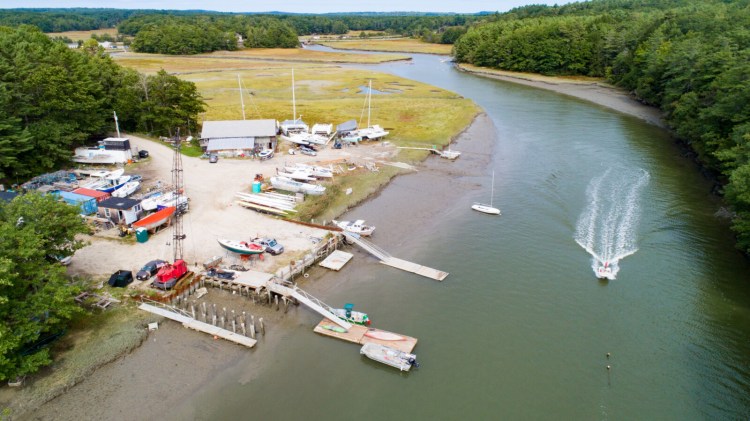The purchase of 12 acres on the Cousins River in Yarmouth could be just the start of an effort to set aside more of the state’s coastline for fishing and aquaculture concerns.
A startup foundation partnered with Coastal Enterprises Inc. to borrow and raise $1.25 million to purchase the land, which has been used for years by boatyards and will receive infrastructure upgrades to attract other marine-related businesses.
Chad Strater, who operates a marine construction business, said he learned about three years ago that the land, owned by boatyard operators Jamie and Joseph Lowell, was going on the market. Strater was renting space from the two brothers and said both he and the Lowell brothers hoped it would remain a working waterfront.
Waterfront land that’s accessible to fishermen, oyster and seaweed harvesters and others who work on the coast has been dwindling in recent years as it gets snatched up by eager developers. Strater said that, by his calculation, only about 21 miles of Maine’s more than 3,400 miles of coastline remains working waterfront.
“You can buy it and build a couple of condos and flip it and sell it for more than a working boatyard would make,” Strater said.
Strater said he looked for ways to swing the purchase price and pay for upgrades while continuing to provide affordable space for boatyards and oyster and kelp harvesters, but “the banks didn’t really like what the numbers added up to.”
So Strater sought another way to raise the money to buy the property on Even Keel Road. Last year, he formed a nonprofit called the Sea Meadow Marine Foundation and landed funding through a federal grant administered by Coastal Enterprises, a Maine-based nonprofit economic development organization. The new foundation also got an operating grant from the Elmina B. Sewall Foundation, a Maine organization that focuses on improving the well-being of people, animals and the environment and seeks to create social equity and community resilience.
Strater said he also collaborated with other groups, including the Island Institute, in developing the nonprofit and planning the purchase. Sea Meadow Marine Foundation is run by a volunteer board, and Strater is president of that board.
Strater said marine-related uses are increasingly getting squeezed out of waterfront land in Maine. He said people paying high prices for waterfront land don’t want their water views obstructed by piles of traps, nets and other gear, and don’t want to deal with the smells of fish or the early-morning noise of fishermen arriving to start up their boat engines.
By buying the Yarmouth site, Strater said, the foundation will be able keep the boatyards that are already there operating while also providing a place to store equipment and unload catches for fishermen and kelp harvesters. He said the plan is to build more dock space to possibly attract more marine users.
According to Strater, the boatyard founders’ sons run a lobster boat building and repair shop that will continue to operate on the site. Other businesses include Greene Marine, founded by Walter Greene, a pioneer in multihull sailboat design and racing and composite work, he said.
In addition, a newly formed aquaculture cooperative will operate on the property with plans to expand. The co-op consists of Spartan Sea Farms, Madeline Point Oysters, Butterfield Shellfish, Pound of Tea Oyster Farm, Nauti Sisters Sea Farm, “and a couple others,” Strater said.
Other groups using the site will include a local rowing club, a marine construction and barge business, and a boat storage and electric outboard motor dealer, he said.
The foundation’s larger goal is “to use our nonprofit to reach out and help other working waterfronts,” Strater said, adding that he’s identified other working waterfronts on the coast that face pressures due to rising property values and would like to help them secure their futures.
He declined to identify the other sites beyond saying they are in southern Maine.
“The working waterfront is a critical aspect of Maine’s economy and environmental health,” Strater said in a statement announcing the Yarmouth purchase. “If the working waterfront goes away, it’s not coming back.”
Send questions/comments to the editors.




Comments are no longer available on this story